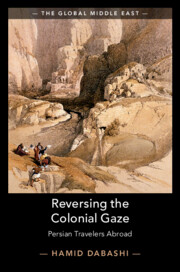Book contents
- Reversing the Colonial Gaze
- The Global Middle East
- Reversing the Colonial Gaze
- Copyright page
- Dedication
- Contents
- Figures
- Preface
- Acknowledgments
- Introduction
- 1 Mr. Shushtari Travels to India
- 2 Mirza Abu Taleb Travels from India
- 3 An Ilchi Wonders about the World
- 4 A Colonial Officer Is Turned Upside-Down
- 5 A Shirazi Shares His Travelogues
- 6 A Wandering Monarch
- 7 Hajj Sayyah Leads a Peripatetic Life
- 8 In the Company of a Refined Prince
- 9 A Wandering Mystic
- 10 In and out of a Homeland
- 11 The Fact and Fiction of a Homeland
- 12 Professor Sayyah Comes Home to Teach
- Conclusion
- Index
2 - Mirza Abu Taleb Travels from India
Published online by Cambridge University Press: 19 December 2019
- Reversing the Colonial Gaze
- The Global Middle East
- Reversing the Colonial Gaze
- Copyright page
- Dedication
- Contents
- Figures
- Preface
- Acknowledgments
- Introduction
- 1 Mr. Shushtari Travels to India
- 2 Mirza Abu Taleb Travels from India
- 3 An Ilchi Wonders about the World
- 4 A Colonial Officer Is Turned Upside-Down
- 5 A Shirazi Shares His Travelogues
- 6 A Wandering Monarch
- 7 Hajj Sayyah Leads a Peripatetic Life
- 8 In the Company of a Refined Prince
- 9 A Wandering Mystic
- 10 In and out of a Homeland
- 11 The Fact and Fiction of a Homeland
- 12 Professor Sayyah Comes Home to Teach
- Conclusion
- Index
Summary
In Chapter 2, “Mirza Abu Taleb Travels from India,” I turn to Abu Taleb Isfahani’s Masir Talebi/Talebi’s Itinerary (1803). Born and raised in an Iranian family in Lucknow, Abu Taleb Mohammad Isfahani traveled from India to Asia and Europe and wrote a detailed and influential account of his observations. Isfahani’s narrative represents an exemplary specimen of Persian prose of his time in South Asia. Known also as “Abu Taleb-e Landani/Abu Taleb from London,” he divides his travelogue into three sections: first, a detailed account of his journeys through Europe; second, his observations concerning the social and political institutions he encounters; and third, his thoughts on Muslim lands from Istanbul to Iraq and Arabia on his way back to India. The fact that the English translation of his travelogue was available even before its Persian original may indicate the particularly poignant presence of Persian-speaking thinkers in the formation of “Orientalist” narratives of the East. What is peculiar to Masir Talebi is that its author began his journey in India, traveled to the rest of Asia, Africa, and Europe, and then performed his pilgrimages in the Muslim lands from the capital of the Ottoman Empire to its Arab provinces. In its pages we read a cogent critique of European imperialism, adjacent to a solid appreciation for its global reach. Abu Taleb Isfahani, as a result, offers himself as a singularly important public intellectual on a transnational (global) public sphere that he navigates, narrates, occupies, and critiques at one and the same time.
Keywords
- Type
- Chapter
- Information
- Reversing the Colonial GazePersian Travelers Abroad, pp. 47 - 72Publisher: Cambridge University PressPrint publication year: 2020

